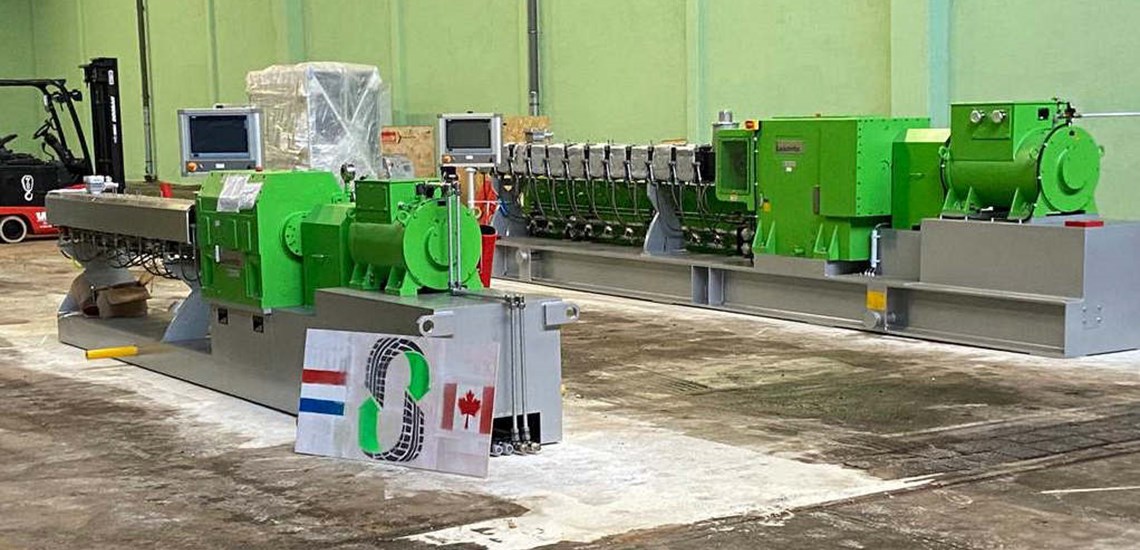Canada-based Tyromer is building a pilot factory in Arnhem to bring its circular rubber products to the European market. Specialising in the devulcanisation of rubber from scrap tyres, Tyromer will fine-tune and exhibit its recycling technology at its new Dutch facility in order to sell the process to third parties. The company is one of the first in the Netherlands to give this hard-to-process residual product a high-quality new life, making it a valuable addition to the Dutch circular economy.
Tyromer Europe for Arnhem
Located at Kleefse Waard Industrial Park (IPKW) in Arnhem, the factory is currently being set up. “We expect to be able to start early in the summer [of 2021],” said Jos van Son, managing director of Tyromer Europe. Tyromer will employ approximately 12 people in Arnhem.
“Tyromer has a unique solution to a major problem: mountains of car tyre rubber that cannot be reused. Companies such as Tyromer, which have solutions for societal challenges with smart technologies, are a welcome addition to the East Netherlands ecosystem. The fact that Tyromer is establishing itself at IPKW, where many companies are involved with energy and circularity issues, is good news for the activity in our region,” added René Brama, investment manager of Tech at the East Netherlands Development Agency (Oost NL).
Tyromer is a perfect fit for the Netherlands’ culture of sustainability. Founded at the University of Waterloo, the start-up can create new rubber from old tyres – turning rubber into a circular product. As a result, the production process requires fewer natural rubbers and fossil fuels. It also saves an additional 94% of energy compared to making “virgin” rubber. In addition, this method reduces CO2 emissions by removing the need to incinerate or combust old rubber. Finally, Tyromer’s process occurs without chemicals or residual waste.
“A great deal of ‘waste’ rubber is a product of Mother Nature. It is a durable and strong material. That must not be destroyed,” said van Son. “Tyromer, led by Canadian professor Costas Tzoganakis of the University of Waterloo, invented a way to make new rubber from used car tyres (and any other rubbers). As the inventor of the process, Tyromer now sells licenses to compounders, who can then use them themselves. The more companies recycle rubber, the greater the environmental benefit.”
At its factory in Arnhem, Tyromer can now convert three sources of rubber into new rubber: natural rubber and synthetic rubber can be obtained from car tyres, and industrial rubber can be extracted from, among other things, seals. The company will collaborate on R&D with two Dutch universities to innovate new ways of recycling various rubber sources, thus advancing the Netherlands’ circular ecosystem.
“There is still a way of development to be able to recycle other types of rubber in the future and thus save them from the waste mountain. We are going to collaborate with the University of Twente and Windesheim University of Applied Sciences, which have a reputation for polymers and rubbers in particular,” said van Son.
Tyromer worked closely with the Invest in Holland Network to find a location in the Netherlands. In addition, because of the project’s contribution to the circular economy and excellent reduction of CO2, Tyromer applied for and was awarded with a Demonstration Energy Innovation (DEI+) subsidy from the Dutch government.
“Oost NL brought us into contact with municipalities where we could possibly settle and helped us find the location for the factory. We also received help from Oost NL and the Netherlands Foreign Investment Agency (NFIA) in creating a Dutch office,” said van Son.
Source: Oost NL



















